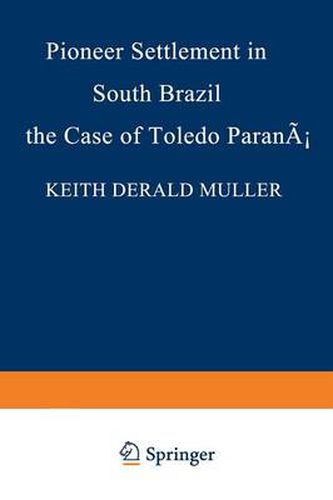Readings Newsletter
Become a Readings Member to make your shopping experience even easier.
Sign in or sign up for free!
You’re not far away from qualifying for FREE standard shipping within Australia
You’ve qualified for FREE standard shipping within Australia
The cart is loading…






This title is printed to order. This book may have been self-published. If so, we cannot guarantee the quality of the content. In the main most books will have gone through the editing process however some may not. We therefore suggest that you be aware of this before ordering this book. If in doubt check either the author or publisher’s details as we are unable to accept any returns unless they are faulty. Please contact us if you have any questions.
In the period since the end of world War II numerous develop ing countries have employed colonization, or planned pioneer settlement, as one method of building a more reliable and bal anced economy. It is felt that the traditional, single-sided sys tems of farm ownership and production with their latifundium and minifundium holdings will gradually and peacefully become less prominent as better settlement systems are introduced and extended. Marked increases in population pressure, large tracts of unused or underused land, and modern improvements in set tlement planning are among other compelling reasons for star ting colonization programs. Of all the areas in the world, the continent of South America probably has the widest variety of planned pioneer settlements as well as the most sizeable programs. Brazil, the largest country on the continent, is actively engaged in populating the vast, emp ty spaces of its interior, and provides excellent opportunities for the scholarly investigation of new frontier settlement types. In addition to the academic discussion of the origin and develop ment of these expressions of man’s expansion into marginal ar eas, the critical examination of relatively new attempts at land settlement is a useful thing because what is to be learned from such studies may be directly applicable to other pioneer zones and, moreover, may be of vital significance to overall economic improvement on the continent. In this monograph, my student, K. Muller, analyzes the South Brazilian frontier colony of Toledo, Parana, founded in 1946.
$9.00 standard shipping within Australia
FREE standard shipping within Australia for orders over $100.00
Express & International shipping calculated at checkout
This title is printed to order. This book may have been self-published. If so, we cannot guarantee the quality of the content. In the main most books will have gone through the editing process however some may not. We therefore suggest that you be aware of this before ordering this book. If in doubt check either the author or publisher’s details as we are unable to accept any returns unless they are faulty. Please contact us if you have any questions.
In the period since the end of world War II numerous develop ing countries have employed colonization, or planned pioneer settlement, as one method of building a more reliable and bal anced economy. It is felt that the traditional, single-sided sys tems of farm ownership and production with their latifundium and minifundium holdings will gradually and peacefully become less prominent as better settlement systems are introduced and extended. Marked increases in population pressure, large tracts of unused or underused land, and modern improvements in set tlement planning are among other compelling reasons for star ting colonization programs. Of all the areas in the world, the continent of South America probably has the widest variety of planned pioneer settlements as well as the most sizeable programs. Brazil, the largest country on the continent, is actively engaged in populating the vast, emp ty spaces of its interior, and provides excellent opportunities for the scholarly investigation of new frontier settlement types. In addition to the academic discussion of the origin and develop ment of these expressions of man’s expansion into marginal ar eas, the critical examination of relatively new attempts at land settlement is a useful thing because what is to be learned from such studies may be directly applicable to other pioneer zones and, moreover, may be of vital significance to overall economic improvement on the continent. In this monograph, my student, K. Muller, analyzes the South Brazilian frontier colony of Toledo, Parana, founded in 1946.